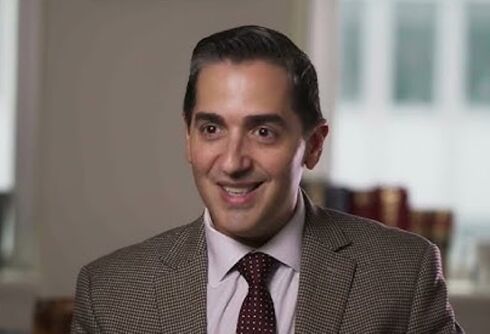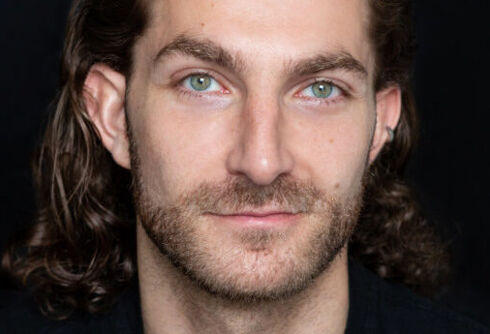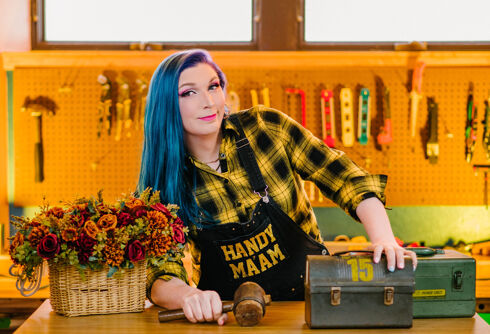Don Lemon is a lot of things: an award-winning journalist, one of CNN’s most recognizable faces, a gay Black man from the South, and one of several “openly Black” people that can spark anger in the right just by speaking.
He’s also the author of two books.
Related: She grew up with MLK and was Kamala Harris’ gym buddy. Meet Donzaleigh Abernathy.
His first book, Transparent, just turned ten this week. In that book, Lemon came out publicly.
Never Miss a Beat
Subscribe to our newsletter to stay ahead of the latest LGBTQ+ political news and insights.
“It wasn’t very long, maybe page-and-a-half… and then I just kept it pushing, because, you know, let people see what they want. I didn’t feel the need to have to, like, delve into more personal aspects of my life other than coming to terms with my sexuality about being gay. And then I just moved on, because I thought that was all I needed people to know,” Lemon reflected to LGBTQ Nation.
“That was sort of my thinking at the time. And… I knew that would have some impact, but I didn’t realize how huge of an impact it would be, that people would care so much that I was gay,” he said. “Maybe I was naïve, because they did, and I became one of the first national journalists to come out.”
Lemon was 45 and one of television news’s few veteran Black stars, making the leap to CNN after becoming recognizable on NBC News shows like Today and NBC Nightly News. Viewers know him for his trademark smile and easygoing persona that hides the no-nonsense straightforwardness Lemon brings when needed.
Lemon became one of CNN’s mainstays and was front and center as part of the media resistance to Trumpism, but it was also when Lemon picked up his pen again. This book, like its author, is more evolved from what readers saw in 2011.
“The first book that I wrote didn’t have the urgency of this one,” he said. “Someone approached me and asked me to write a book. It certainly was not an autobiography like this one, but I wanted people to get to know me, you know, just a little inside look of me beyond television. And when that book came out, I had shared certain things about myself, about growing up and as a journalist, some of the challenges that most people are not supposed to be transparent about.
“When I wrote the book, the request of the publisher was to write about my journey and experiences as a journalist, growing up and living in America. I could never write about that experience, that journey as a journalist without being honest about certain things — about being gay and aspects about my personal life. Because that’s my experience.”
We talked to Lemon before his nightly show, as the jury was still out on the trial for Derek Chauvin, the officer charged with (and now convicted for) the murder of George Floyd, and less than ten months after he decided to write This Is The Fire.
“It’s an accomplishment in under a year, I mean, we did it in like six months. The book just really poured out, and I was bound and determined to get the book out as quickly as possible, but not so quickly,” Lemon shared. “It’s interesting – it’s almost as if we’ve been stuck in time, right? Here we are, right back to a very similar set of circumstances, and it’s almost been a year.”
Lemon stressed the “urgency” that he wrote the book in, and it is apparent from the beginning. The book opens with a letter to his grand nephew written on May 25, 2020 — “the day George Floyd died,” he quickly reminded us.
“As the unrest and the summer of 2020 and George Floyd protests were happening, I was saying in my head and heart, like, ‘Gosh, I wish I could write a book overnight.’ Get all these feelings out that I wish I could get out for years about racism in this country.”
So Lemon did, although “overnight” translated into just under 10 months. As we near the year mark of Floyd’s death, Lemon’s book debuted atop the New York Times‘ best-seller list.
Well-Trod Ground
Lemon wasn’t looking to break new ground with This Is The Fire, but sought to survey the already familiar, scorched earth that racism leaves behind: the land that we’re standing on now as the fire moves around us.
Lemon describes how we can prepare for when it circles back around, saying, “I think all the tools are there for the times that we’re in; it’s very relevant right now. I think that’s why it’s doing so well — no, I know that’s why it’s doing so well,” he remarked, “because this book is everything that is now. This Is the Fire.”
For many, that fire is racism, but Lemon recognizes that LGBTQ people are still facing that fire. Even though sodomy laws have been overturned and marriage equality the right to serve in the military have become the law of the land since Lemon came out, he knows that the fire is coming for the LGBTQ community now more than ever — especially in a year where more anti-LGBTQ laws have passed than ever before in United States history.
He doesn’t compare being gay or trans to being Black. But he knows the kinship that comes between those who have been marginalized in society: “while the experiences may be similar, they are not exactly the same.”
“I will say, I think that I have had much more, much more discrimination and many more challenges in being a Black man, then from being a gay man,” he said.
“The obvious thing is that the forces in our society who like to exploit our fear will use this moment to divide us,” Lemon noted. “The forces who are trying to unite us, hopefully, can use this moment to bring us together, to help us understand each other, and each other’s humanity, to help us realize that we’re actually not that far apart.”
Lemon is a quick thinker and eloquent — not surprising since he’s been on TV, teleprompter-free, for years — so the way he explains and tells his experiences, both in the book and in conversation, is appealing. He is also smart enough to recognize the truth.
“Listen, I don’t think that you will ever end racism.”
He explained, “I am hopeful in the book, that it’s going to end. … I think that you can make it better. So when I say, “this is the fire,” the question is, are we going to let us consume us, or are we going to be able to manage it?”
In Lemon’s view, “I don’t know if we’ll put out all the embers of racism out. I don’t think we’ll ever extinguish all the embers. I think we can contain it. As we do with controlled fires or even forest fires. So I think there’s a way to make it better.”
He added, though, “As I say in the book, if anybody tells you that they have all the answers, run the other way – because they don’t.'”
This Is The Fire continues the title of James Baldwin’s 1963 novel The Fire Next Time. Baldwin also wrote about race and sexuality. Lemon wrote his book from a moment of anxiety and disappointment, as did Baldwin; Lemon from witnessing the Black Lives Matter movement and Baldwin from the Civil Rights movement.
There are clear differences, but writing from the moment that the two embody is not a simple task. Baldwin would later see his present become the better future — the culmination of the Civil Rights era — but not completely saved.
The fire would come next time, and many times again, and especially for Black LGBTQ people, they have yet to stop circling.
Lemon, like Baldwin, used his experiences of the past to contextualize the present in the hope to shape the future. But for marginalized people, those especially who have had to rely on kinship in our communities — the affirmation of our experiences by someone else never feels well-trodden enough.
“I hope out of this fire,” he added, “the pressure molds us into the fine diamonds that we are.”
He ends our conversation by saying that if LGBTQ people “keep pushing for equality and equity, it will happen. [And] it is.”
“This Is The Fire: What I Say to My Friends About Racism” is available everywhere you get books, e-books or audiobooks.
Don't forget to share:














